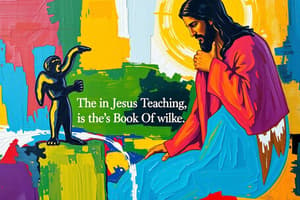Podcast
Questions and Answers
What message is conveyed by Jesus referring to himself as 'the bread of life'?
What message is conveyed by Jesus referring to himself as 'the bread of life'?
- He requires followers to fast.
- He is a literal baker.
- He will always provide physical bread.
- He sustains spiritual nourishment. (correct)
Which scripture emphasizes Jesus as the source of light?
Which scripture emphasizes Jesus as the source of light?
- Revelation 1:8
- John 9:5 (correct)
- John 8:23
- John 10:11
What does Jesus signify when he refers to himself as 'the resurrection and the life'?
What does Jesus signify when he refers to himself as 'the resurrection and the life'?
- He believes in reincarnation.
- He shows authority over life and death. (correct)
- He is a religious teacher.
- He is a historical figure.
What is the meaning of Jesus identifying as 'the good shepherd'?
What is the meaning of Jesus identifying as 'the good shepherd'?
What does it mean when Jesus refers to himself as 'the vine'?
What does it mean when Jesus refers to himself as 'the vine'?
Flashcards are hidden until you start studying
Study Notes
Key Statements of Jesus in the Book of John
- Jesus identifies Himself as the "bread of life," emphasizing spiritual nourishment (John 6:35).
- He states His divine origin with the declaration, "I am from above," indicating His heavenly connection (John 8:23).
- Christ claims eternal existence with, "Before Abraham was, I am," asserting His preeminence over time (John 8:58).
- Jesus proclaims, "I am the light of the world," symbolizing guidance and truth in a dark world (John 9:5).
- He refers to Himself as "the door," signifying the only access point to salvation (John 10:9).
- As "the good shepherd," He illustrates His protective and caring role over His followers (John 10:11).
- Jesus claims authority by referring to Himself as "the Son of God" (John 10:36).
- He declares, "I am the resurrection and the life," offering hope of eternal life (John 11:25).
- Acknowledging His role, He states, "Ye call me Master and Lord," reinforcing His position of authority (John 13:13).
- Jesus asserts, "I am the way, the truth, and the life," underscoring the path to God (John 14:6).
- He describes Himself as "the vine," symbolizing the connection between Him and His followers (John 15:5).
- In a declaration of His kingship, He states, "Thou sayest that I am a king," discussing His purpose (John 18:37).
- Revealing His eternal nature, He refers to Himself as "Alpha and Omega," representing the beginning and the end (Revelation 1:8).
- He reiterates His eternal presence by stating, "I am the first and the last" (Revelation 1:17).
The Role of Shepherd
- The Greek word for shepherd, "poimen," is used in significant contexts indicating leadership and care.
- Ephesians 4:12 connects "poimen" to various church leaders, portraying them as guides and protectors.
- In Matthew 9:36, Jesus' compassion for the crowds is likened to a shepherd's concern for scattered sheep, reinforcing His empathy.
- Psalm 23:1-2 describes the Lord as a shepherd, highlighting themes of guidance, provision, and peace.
The Bread of Life
- In John 6:35, Jesus identifies Himself as the "bread of life," signifying that belief in Him satisfies spiritual hunger and thirst.
Studying That Suits You
Use AI to generate personalized quizzes and flashcards to suit your learning preferences.




